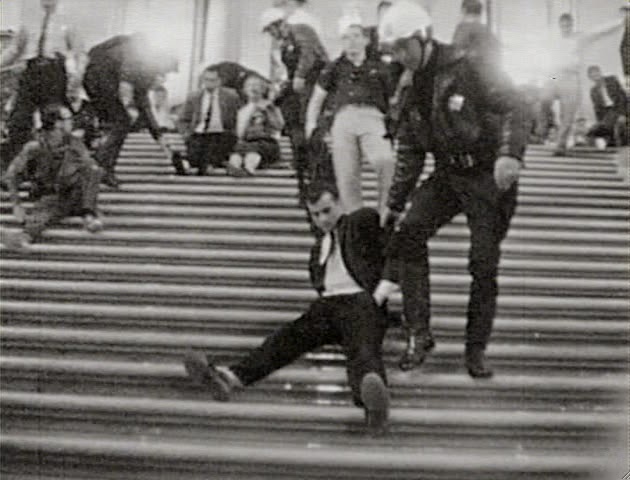 |
| Screen capture image from First Run Features DVD |
WHAT: Berkeley In The Sixties is a well-crafted, aesthetically conservative film about leftists, radicals, and other key figures in the 1960s social protest movements that have been so strongly associated with the East Bay city's public image ever since. For those of us who know this period only second-hand, it's a concise primer on far-ranging subjects like the Free Speech Movement, Anti-Vietnam War protests, "Hippie" counterculture, the Black Panthers, and the battle over People's Park. Made when the events were 20-30 years old (imagine, as a parallel, a documentary on the final ten years of South African apartheid released today), its interviews with 1960s activists show a remarkable candor about the relative strengths and weaknesses of their own protest tactics, frozen at a pre-Clinton-era moment. It would be interesting to know if the interviewees (including Susan Griffin, David Hilliard and Frank Bardacke) would have similar things to say today, now that the term "Free Speech" has been appropriated by the Right to mean "money". At any rate, this nearly quarter-century-year-old film has yet to be superseded by another documentary on these topics, as far as I'm aware.
In addition to interviews, Berkeley in the Sixties is constructed of often astonishing archival footage, collected from from rarely-seen films from the period, some by names as well-known as Agnès Varda, David Peoples, Irving Saraf, Lenny Lipton, and Will Vinton. Although I found it odd that Scott Bartlett's 1972 work OffOn was used to illustrate the visual component of a March 1966 Jefferson Airplane concert thrown by the Vietnam Day Committee and later denounced by then-gubernatorial candidate Ronald Reagan. The first several archival clips used are not from Berkeley at all, but from early 1960s San Francisco protests that are said to have laid the foundation for the galvanization of UC Berkeley students to fight for freedom of speech on their own campus. The image above is from a remarkable anti-HUAC protest in San Francisco's City Hall in 1960.
WHERE/WHEN: Screens 7PM today only at the Pacific Film Archive.
WHY: Tonight's screening, which will be attended by filmmaker Kitchell as well as Frank Bardacke and other activists from the era, launches an important series at the Pacific Film Archive that will last until the end of next month. Entitled Activate Yourself: The Free Speech Movement At 50, this series collects a diverse array of rarely-seen films that together aim to paint an essential portrait of the Bay Area's political roots from a half-century ago or so. Tuesday, September 23rd's show highlights films from the San Francisco Newsreel media collective, as well as Desert Hearts director Donna Deitch's early PP1, which sounds irresistible from the PFA's description to this Steve Reich & John Cage fan. October 9th's Sons and Daughters is one of the especially obscure films whose footage is borrowed for Berkeley in the Sixties: extremely charged documentation of protesters trying to convince young military recruits to turn away from the Oakland Army Terminal where they're being processed on the way to Vietnam. October 14th's program features two sub-feature-length documentaries made by filmmakers with a very different viewpoint from that of the anti-HUAC protesters shown in the image above, and will be contextualized by a UC Berkeley law professor following the screenings.
Most of the series films are from the era itself, but KPFA On The Air by Veronica Selver (who was the editor of Berkeley in the Sixties) is a portrait of the broadcasting fulcrum of politics and culture released 51 years after the station first went on the air in 1949. It screens October 26th with Norman Yamamoto's Second Campaign. Finally, the series ends with the sole non-documentary of the set, Art Napoleon's The Activist, shot on the cheap in Berkeley and released with an X rating the same year as Midnight Cowboy was.
Although this series is certainly of interest to cinephiles and political history buffs from across Frisco Bay, not just Berkeley, most of its films do focus on that city. San Francisco gets its own spotlight in a perhaps-complimentary Yerba Buena Center for the Arts series showcasing activist-oriented films shot on this side of the Bay. Starting October 2nd, canonized independent classics like The Times of Harvey Milk and Chan is Missing rub up against lesser-known films documenting Frisco's key communities, such as Take This Hammer featuring James Baldwin on a visit to Hunter's Point (showing free October 26th) and Alcatraz Is Not An Island, about the "Urban Indians" who occupied the former prison, future tourist trap in November 1969. I'm especially excited by the 16mm screening of Curtis Choy's 1983 The Fall of the I-Hotel, which documented the destruction of the last remnant of a now-almost-forgotten neighborhood known as Manilatown. I've been wanting to see it for years, and I hope to be there among an intergenerational audience of activists and cinephiles, historians and tech workers, landlords and tenants, SF natives and newcomers, all realizing we need to come together to look at this city's past if we're going to understand how to prepare for its future.
HOW: Berkeley in the Sixties screens from a 16mm print





No comments:
Post a Comment